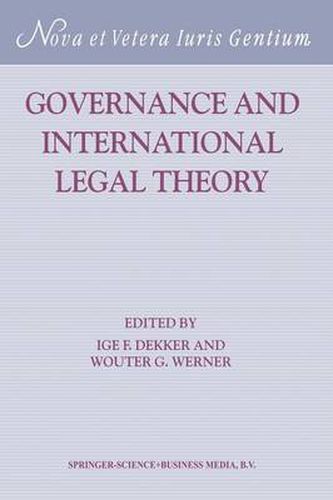Readings Newsletter
Become a Readings Member to make your shopping experience even easier.
Sign in or sign up for free!
You’re not far away from qualifying for FREE standard shipping within Australia
You’ve qualified for FREE standard shipping within Australia
The cart is loading…






This title is printed to order. This book may have been self-published. If so, we cannot guarantee the quality of the content. In the main most books will have gone through the editing process however some may not. We therefore suggest that you be aware of this before ordering this book. If in doubt check either the author or publisher’s details as we are unable to accept any returns unless they are faulty. Please contact us if you have any questions.
Globalisation and international governance constantly pose challenges to international law. This constant challenge can only be understood if one keeps in mind that globalisation and international governance are not simple and linear developments, but rather complex and contradictory processes. The emergence of several overlapping and competing normative orders - characterized in terms of ‘new medievalism’ and ‘legal pluralism’ - has given impetus to some age-old debates in international law: What is the role of the ‘international community’? What is the proper function and meaning of state sovereignty in international law? What are the powers of international organizations in relation to the overlapping legal orders of their member states? At a more practical level, the problem of ‘legal pluralism’ is discussed in the context of the proliferation of international tribunals: how does this affects the unity and coherence of international law and what should be the proper role of lawyers in dealing with competing norms and competences? Finally, the complex and contradictory nature of international governance is illustrated by the role of international non-governmental organizations in different periods and areas, such as criminal law, environmental law and cyberspace. This book discusses the above-mentioned topics from a multidisciplinary perspective. It combines insights from international relations theory, legal theory and international law in an attempt to clarify some issues of globalisation, international governance and international law.
$9.00 standard shipping within Australia
FREE standard shipping within Australia for orders over $100.00
Express & International shipping calculated at checkout
This title is printed to order. This book may have been self-published. If so, we cannot guarantee the quality of the content. In the main most books will have gone through the editing process however some may not. We therefore suggest that you be aware of this before ordering this book. If in doubt check either the author or publisher’s details as we are unable to accept any returns unless they are faulty. Please contact us if you have any questions.
Globalisation and international governance constantly pose challenges to international law. This constant challenge can only be understood if one keeps in mind that globalisation and international governance are not simple and linear developments, but rather complex and contradictory processes. The emergence of several overlapping and competing normative orders - characterized in terms of ‘new medievalism’ and ‘legal pluralism’ - has given impetus to some age-old debates in international law: What is the role of the ‘international community’? What is the proper function and meaning of state sovereignty in international law? What are the powers of international organizations in relation to the overlapping legal orders of their member states? At a more practical level, the problem of ‘legal pluralism’ is discussed in the context of the proliferation of international tribunals: how does this affects the unity and coherence of international law and what should be the proper role of lawyers in dealing with competing norms and competences? Finally, the complex and contradictory nature of international governance is illustrated by the role of international non-governmental organizations in different periods and areas, such as criminal law, environmental law and cyberspace. This book discusses the above-mentioned topics from a multidisciplinary perspective. It combines insights from international relations theory, legal theory and international law in an attempt to clarify some issues of globalisation, international governance and international law.